Blog Feed
It’s Sharkinar Time: Are You Ready?
The Sharkinar is an annual meeting of shark loving ocean loving online influencers who want to use Shark Week to promote science and conservation. Hosted by Upwell. Register now!
UPDATE: Watch the Sharkinar!
Back in 2012, we told you that Shark Week is the single biggest moment for the online ocean conservation. Team Ocean heard the call and jumped in the #SharkWeek waters, and helped increase the volume of conservation and science in 2012 and again in 2013.
On a typical day, we measure between 30,000-50,000 online mentions of sharks. In 2013 the first day of Shark Week pushed shark mentions close to a million. As we never tire of saying, Shark Week really is the Super Bowl (or World Cup) of sharks.
"Shark Week is the Super Bowl of the ocean" #scio14 #scioresearch @WhySharksMatter @upwell
— Brianna Elliott (@BriannaWElliott) February 28, 2014Through monitoring online convs, @upwell discovered that Shark Week is the "Super Bowl of the ocean!" #leanimpact pic.twitter.com/mhSbXz02Dj
— Jenn Yoo (@jooy8) January 24, 2014#Sharkweek is the "social media Super Bowl" for the ocean. Trick= find the shark week for your issue. @fitz350 #SMoP14
— Rachel Katz (@hazeltrack) May 22, 2014
Shark Week 2014 is approaching faster than a scalloped hammerhead: it starts August 10. We want you to be ready for the ultimate ocean outreach event, so it’s time for Upwell’s third annual Sharkinar!
Our Sharkinars are online meetings that bring in scientists, activists, bloggers, journalists, tweeters, and nonprofits to share data, plot strategy, and complement each others Shark Week campaigns and grow the online conversation together, in a way that benefits the ocean.
Unsurprisingly, the strategies we shared for Shark Week are quite similar to those that Google just encouraged its affiliates to use during the World Cup.
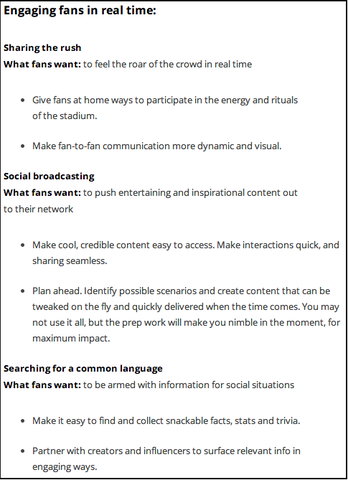
What Google wrote about the World Cup: basically what Upwell has been saying about Shark Week for years. #win
Our first Sharkinar is Thursday, July 24 at 11 AM PST (2 PM EST). Now is a good time to start using the #sharkinar and #sharkweek hashtags to begin building momentum.
Sign up for the 2014 Sharkinar Today!
Upwell fellows take the data reigns
Upwell is expanding its Big Listening practice, to apply what we've learned measuring and tracking ocean conversations to other social change movements. To meet this need, Upwell established a Fellows program for accomplished, mid-career professionals. Upwell Fellows work directly with senior staff on core Upwell research projects, while building social media analytics and conversation mapping skills. We aim to grow capacity in the movements we work in, and the fellowship program allows Upwell to complete critical research while growing sector capacity by leveling up key individuals.
We're thrilled to have Ted Fickes and Kathryn Jaller joining us as Upwell fellows. They've already been working with us for about a month, and each will be cataloguing their experience to share. Check out the first blog post from Ted and Kathy to learn a bit about what they're learning, asking, and developing with us.
Ted Fickes
Upwell Fellow
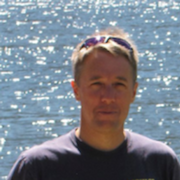
Ted Fickes has worked at the intersection of digital communications, on the ground organizing, public policy and nonprofit management since the mid-1990s. Ted served as Development Director for organizations in Denver and Chicago, put together one of the nation's first nonprofit technology circuit rider programs, founded Colorado Conservation Voters, and started his first consulting firm in 2002 to help progressive nonprofits and campaigns better communicate online. From 2006 to 2011, Ted managed online campaigns and digital strategy for The Wilderness Society. Ted started Bright+3 in 2011 to develop and test people-focused campaign and content strategies with innovative nonprofits, startups and campaigns. Bright+3 has helped incubate new publishing models and content strategies with a focus on how data can be used to track and inform the strength of communications across networks. He is a graduate of Northwestern University and the Lyndon B. Johnson School of Public Affairs at the University of Texas at Austin. Ted is also an advisor to Social Movement Technologies and Web of Change.
Kathryn Jaller
Upwell Fellow
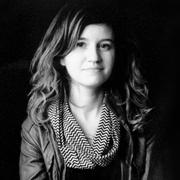
Kathryn is a museum technologist and content strategist. She leads digital publishing at the Contemporary Jewish Museum and has spoken widely on the growth of social media in cultural institutions, including at South by Southwest. She founded the "Social Media Superfriends," a consortium of Bay Area social media practitioners, and her work has been featured in The New York Times. She is also an artist who makes things, sometimes inspired by science. Find her latest experiments on Twitter.
Introducing Andrew Thaler, our new Tide Report writer!
Earlier this year, we announced that Upwell was so busy that we needed some extra hands. This week we'll be introducing some of the awesome fantastic people who've joined the Upwell crew.
Our signature ocean newsletter, The Tide Report, needed an ocean-loving, witty science nerd to take the writing reigns. We are thrilled and blessed that Andrew David Thaler, of Southern Fried Science fame, has joined us as a Tide Report writer. Not only is he a marine science aficionado, but he's also a master of the legendary Eastern Carolina Barbecue - a skill he developed from spending over a decade living in rural North Carolina before moving to the Bay Area this year.
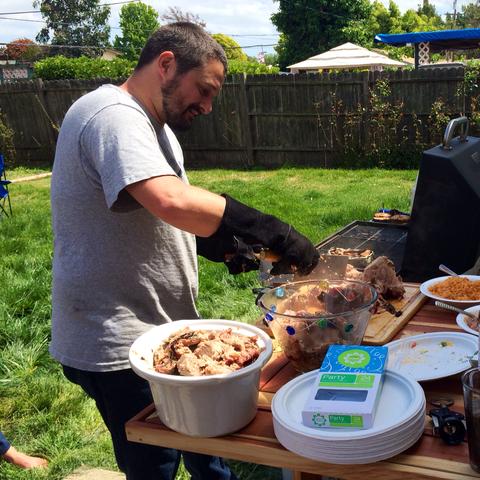
Andrew David Thaler
Andrew is a deep-sea ecologist and population geneticist, who has worked in ocean conservation for the last 8 years. He has published broadly on deep-sea conservation, marine policy, and science/environmental communication. He is the Editor-in-Chief of Southern Fried Science, one of the most widely read marine science and conservation blog in the English language.You can find him on Twitter and Google+ or check out his most recent outreach project, #DrownYourTown.
A Social Labs Revolution in the Making
Planning is killing us and prototyping will save us
- that's the provocative premise of a new book from Zaid Hassan, cofounder of Reos, and host to a small but mighty group of activists, facilitators, designers and social entrepreneurs that I joined earlier this month for a workshop at the Lokey Graduate School of Business at Mills College.
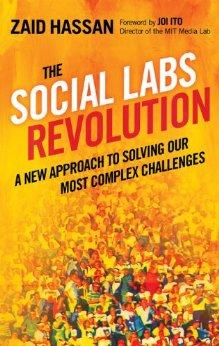
As a nonprofit consultant and participant in over a dozen strategic planning processes, I've seen the limitations of traditional planning approaches first-hand. The difficulties are confounded when the planning centers on navigating situations or challenges of complexity, where the actions undertaken will inevitably produce reactions from multiple stakeholders and result in a fundamentally new situation.
The startup community, by and large, gets this. The social sector - or at least the funding institutions within the social sector - mostly does not.
For all the talk and activity around Lean Impact, most of the innovation-focussed philanthropic resources are still being passed out to plans constructed within a traditional planning paradigm. Even when the focus is on allegedly on the outcomes, the desire for accountability often results in the imposition of a planning methodology that values presumptive specificity over messy reality (#imho).
Furthermore, the societal challenges we face today are incredibly complex. From climate change to global poverty, from infectious diseases to cyber conflict, the world has never been more interconnected and never been more unsuited to taking on those challenges within a planning paradigm. What are some alternatives?
Hassan laid out a blueprint for what he calls Social Labs - interdisciplinary teams empowered to explore a portfolio of proposed solutions to a particular social or environmental challenge. They do this not by writing white papers or convening blue-ribbon panels, but rather by doing - by working to prototype the implementation of promising ideas in 30- or 60-day sprints. This approach, much like Upwell's own MVC (minimum viable campaign) model of campaigning, draws heavily from agile software development and recognizes that only by getting out of the building (or conference hall) can you test your ideas with real fidelity.
Here's a description in his own words: [UPDATE: the video embed has gone astray - here's Zaid on YouTube]
If you know you're almost inevitably going to fail, then the point is to learn from failure as quickly as possible in order to move forward. Hassan and Reos have brought forward a truly promising approach to big, thorny, complex problems.
I'll be watching their progress with interest, but more importantly with my sleeves rolled up.
What's In Your Bukkit? Bounding An Issue for Big Listening
Here on the good ship Upwell we're often asked to help folks think through what Big Listening for their cause or issue might look like. This raises some intriguing questions about what their cause or issue is - what's in and what's out of their particular mental model for that thing. Call it a bukkit, m'kay?
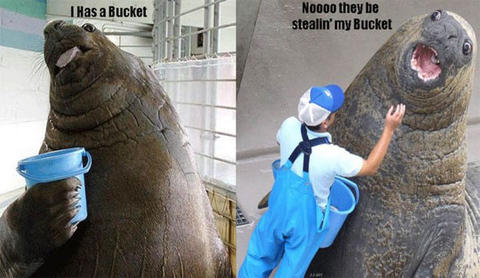
What's in the LOLRUS's bukkit? Most likely bivalves.
Measuring something requires you to define it. The trick in measuring a conversation is that conversations change over time as participants engage in dialogue. And as conversations dynamically evolve over time, so too do the methods of expression (i.e. terminology, imagery, metaphors, etc.), the composition of participants, and the accompanying platforms. Much like species evolution, these changes are not always in a direction that we perceive to be fruitful. Evolution can lead to progress just as it can lead to dead-ends or fragmentation. Because of this, no conversational “listening” can ever be exhaustive (as some elements of the conversation will always be overlooked), nor can it be perfectly accurate (as noise will always creep in).
In bounding an issue for the purpose of (big) listening to it, we begin by developing a conceptual framework. For the purposes of explanation, let’s imagine our topic is marine debris a.k.a. trash in the ocean.
We would begin by outlining the conceptual and temporal boundaries of analysis for marine debris. The temporal aspect is important because a keyword group developed for one time period may lose significant accuracy (and utility) when applied to another period. For the conceptual outlines we often make use of a mind map such as the one for ocean acidification shown below.
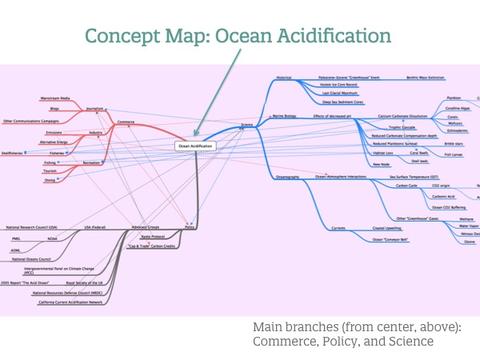
For marine debris the concept map would include items such as marine trash, the pacific gyre, marine plastics, great pacific garbage patch, seaplex (minus exclusions for the botanical shampoo of the same name), albatross AND plastic. The concept map would also include people, campaigns, expeditions and organizations such as Miriam Goldstein (a marine debris expert), The Trash Free Seas Alliance, the Plastiki, and Seaplex.
The concept map becomes a design artifact for further conversations about the conversation. Although we sometimes shortcut this process in the interests of time, we refine the map through a series of discussions and exchanges with subject matter experts and knowledgeable people in the industry or industries at play. It's worth noting that since we're interested in public conversations, speaking only with the issue wonks can be counter-productive, since their language is often arcane and infrequently used within the culture at large. The map for Oceans concepts (shown above) actually had to be dramatically revised once we realized it was full of science jargon and lacking anything to do with Mermaids, little or otherwise.
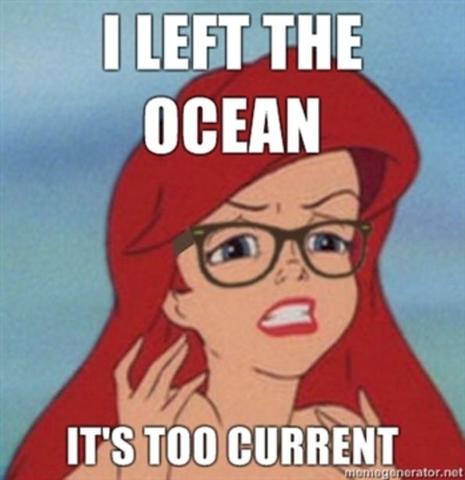
Hipster Ariel was in your bukkit before it was cool.
Once we have a solid map of the conversation, we turn the map into a series of keywords - but that's a topic for another day. So if you're thinking about what Big Listening for your issue might look like, consider thinking of a bukkit. What's innit?